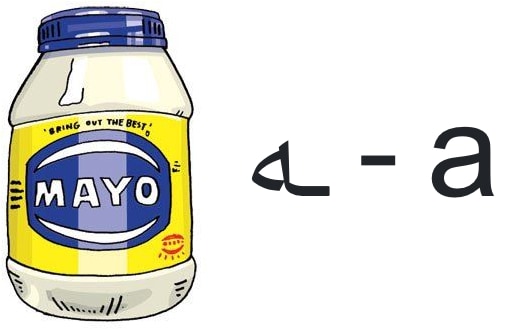Mayonnaise
In the earlier chapters we learned that words inside sandwiches inflect. There is also a certain type of sandwiches that adds a little extra ـه - -a to certain words. Some linguists might call this the "ablative" case, but that term doesn't quite fit how it's used in Pashto. In the interest of linguistic accuracy, we will call this mayonnaise.

When to Use Mayo
To add mayonnaise to a sandwich there are two conditions:
- It has to be one of the mayo-friendly sandwiches below.
- The words getting mayo have to be Pattern #1 masculine, singular words.
Mayo-Friendly Sandwiches 🥪
"from / than"
"without"
"until / up to"
How to Add Mayo
To add mayonnaise, you simply add a ـه - -a to the end of the Pattern #1 masculine, singular word. This is exactly the same process as making a bundled noun.
Pattern #1 masculine, singular word + ـه - -a
Examples
Let's look at some examples of how we add mayo to these sandwiches when they contain Pattern #1 masculine, singular words.
With کور - kor (house - n. m.):
With زحمت - zahmat (effort/trouble - n. m.):
Notice that with other kinds of words in these sandwiches, they just inflect as they normally would.
If we put a Pattern #1 masculine, singular noun in a sandwich, any Pattern #1 adjectives and intensifiers will also inflect.
The words ډېر - Der (very) and غټ - ghuT (big) are also Pattern #1 masculine, singular words, so they also get mayonnaise!
Other notes
Mayo Only Goes on Pattern #1 Words
If a word is Pattern #4 or Pattern #5, it does not get mayonnaise. Some of these words may look the same as the Pattern #1 words because they end in a consonant. But remember, Pattern #4 and Pattern #5 words are different. They have their own way of inflecting.
Is Mayo Optional or Required?
If the sandwich has no end-piece (e.g. له ... - la ... or تر ... - tur ...) then mayonnaise is required. You cannot make the sandwich without it.
If the sandwich has an end-piece (e.g. له ... څخه - la ... tsúkha) then mayonnaise is optional. In that case, it's a matter of taste.